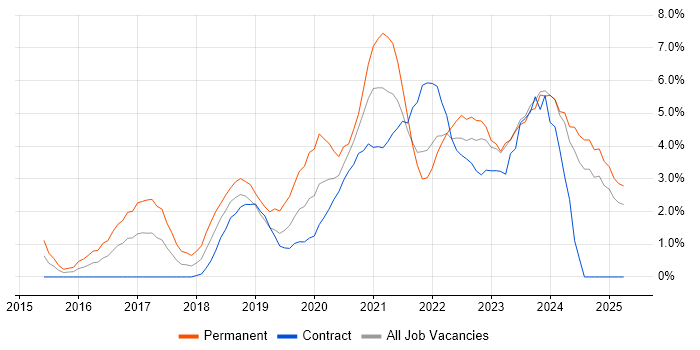Microsoft Power Platform
Lancashire > Preston
The table below provides summary statistics and salary benchmarking for jobs advertised in Preston requiring Power Platform skills. It covers permanent job vacancies from the 6 months leading up to 14 January 2026, with comparisons to the same periods in the previous two years.
| 6 months to 14 Jan 2026 |
Same period 2025 | Same period 2024 | |
|---|---|---|---|
| Rank | 7 | 14 | 14 |
| Rank change year-on-year | +7 | 0 | +22 |
| Permanent jobs citing Power Platform | 14 | 16 | 5 |
| As % of all permanent jobs in Preston | 14.89% | 11.51% | 4.90% |
| As % of the Cloud Services category | 53.85% | 48.48% | 19.23% |
| Number of salaries quoted | 6 | 0 | 3 |
| 10th Percentile | £25,813 | - | £30,400 |
| 25th Percentile | £31,125 | - | £31,000 |
| Median annual salary (50th Percentile) | £40,000 | - | £32,000 |
| Median % change year-on-year | - | - | -28.89% |
| 75th Percentile | £42,500 | - | £41,625 |
| 90th Percentile | - | - | £47,400 |
| Lancashire median annual salary | £26,125 | £55,000 | £40,750 |
| % change year-on-year | -52.50% | +34.97% | +1.88% |
All Cloud Computing Skills
Preston
Power Platform falls under the Cloud Services category. For comparison with the information above, the following table provides summary statistics for all permanent job vacancies requiring cloud computing skills in Preston.
| Permanent vacancies with a requirement for cloud computing skills | 26 | 33 | 26 |
| As % of all permanent jobs advertised in Preston | 27.66% | 23.74% | 25.49% |
| Number of salaries quoted | 13 | 16 | 21 |
| 10th Percentile | £30,700 | £32,375 | £30,000 |
| 25th Percentile | £37,500 | £57,688 | £35,000 |
| Median annual salary (50th Percentile) | £40,000 | £66,250 | £46,000 |
| Median % change year-on-year | -39.62% | +44.02% | +2.22% |
| 75th Percentile | £60,000 | £73,625 | £47,000 |
| 90th Percentile | £70,000 | £97,500 | £57,500 |
| Lancashire median annual salary | £40,000 | £52,500 | £42,500 |
| % change year-on-year | -23.81% | +23.53% | - |
Power Platform
Job Vacancy Trend in Preston
Historical trend showing the proportion of permanent IT job postings citing Power Platform relative to all permanent IT jobs advertised in Preston.

Power Platform
Salary Trend in Preston
Salary distribution trend for jobs in Preston citing Power Platform.

Power Platform
Salary Histogram in Preston
Salary distribution for jobs citing Power Platform in Preston over the 6 months to 14 January 2026.
Power Platform
Co-Occurring Skills & Capabilities in Preston by Category
The following tables expand on the one above by listing co-occurrences grouped by category. They cover the same employment type, locality and period, with up to 20 co-occurrences shown in each category:
